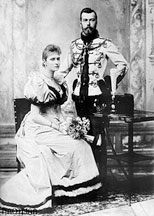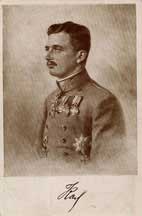
FGF E-Package
The Confederate Lawyer
September 14, 2011
World War I
Part II: The Consequences
by Charles G. Mills
fitzgerald griffin foundation
See World War I, Part I: The Beginning
GLEN COVE, NY — World War I introduced many new horrors into combat. Gas warfare is perhaps the most striking because of the new types of injuries it inflicted. The machine gun was perfected, and far too many died charging against machine guns in the vain hope of moving the front line a few yards. The introduction of aerial bombing brought a far greater potential for war on civilians. Submarine warfare, invented by the Confederate Navy, was enhanced by the Germans and became a new weapon of terror. The Germans abandoned many provisions of international law, machine-gunned people in lifeboats, and marched through neutral countries. This was the triumph of the positivist jurisprudence of the German law schools.
and their five children were
murdered by the Bolsheviks in 1918.
Blessed Charles (1887-1922) was Emperor
of Austria and King of Hungary until he was forced into exile on an island as a result of World War I. He was beatified by
Pope John Paul II in 2004.
was Germany's last Kaiser.The war did not end with a spectacular victory on the battlefield. Seizing the opportunity to stoke the fires of unrest in Russia, the Germans let Lenin pass through their country en route to Russia. Lenin’s eventual victory led to the murder of the German emperor’s cousin Nicholas, the Czar of Russia, and the Czar’s wife and children. The Italians turned the tide against Austria. The Blessed Charles IV, who had become the new Austrian Emperor, tried to make a separate peace for Austria, but the allies would not negotiate with him in good faith. Finally, the Germans began losing on the Western front and an armistice was successfully negotiated.
The old world created in 1815 with the defeat of Napoleon Bonaparte was gone completely. All of the major participants in the war entered into a new era.
German Kaiser William II abdicated at the end of the war. The victorious allies required Germany to pay such huge reparations for its role in the war that its economy was ruined. It underwent a period of licentiousness and corruption, followed by a tyranny, the massive destruction of World War II, and years of division between the two eventual superpowers.
Austria not only lost all the other parts of its empire but even a large area of German-speaking Austrians who were incorporated into Italy. Eventually, the pro-Nazi elements of Austria imposed Nazi tyranny on the whole country. Blessed Charles IV was exiled in poverty on the island of Madeira at the end of the war.
Turkey was dismantled, and leadership of Islam passed from Turkey to the Arabs, with hideous consequences we face today.
England lost a substantial portion of its brightest young men in war. It came out of the war facing a new world order that was beginning to despise colonialism, Britain’s greatest asset. Pacifist reaction set in, and the Oxford Union voted never to fight for King and Country.
France suffered 1.4 million deaths in the war. After the war, its Popular Front government introduced the socialist reforms that have hampered France ever since. In World War II, the Germans took terrible revenge on France.
Italy acquired some territory, including a German-speaking region that is still a very unhappy minority. Italy was furious when the city of Fiume was internationalized, but within a few years it simply marched in and took it. Italy desperately wanted to be like other great powers with colonies in Africa. Italy got its way while losing its reputation in the world when it used toxic gas in independent African countries as part of its effort to acquire colonies. Although Italy’s government in the 1920s and 1930s (with one exception) did not kill people for political dissent like Nazis or communists, it was far from benign. It abused its dissident citizens through such practices as beating them with clubs, giving them overdoses of laxatives, or confining them to small villages.
Hungary was seized by communists at the end of the war, but they were quickly driven out by Miklos Horthy, a Hungarian admiral in the Austrian Navy. He established an authoritarian government that lasted until Hungary was trapped between the Nazis and the Soviets in World War II. After World War II, the country lived for two generations under one of the most brutal communist governments of Europe.
Russia quickly went from World War I to one of the worst tyrannies the world has ever seen.
Serbia got its Kingdom of Yugoslavia, which has now been dismantled by the will of its many peoples who never wanted it.
The United States fared best of all. No majority could be found in the United States Senate for any version of the great European treaty designed to remake the world. We stayed out of the League of Nations and effectively turned our backs on the Eastern Hemisphere. Perhaps the greatest price we paid is that the American masses also turned their backs on Western culture.
What of the people who started the war, the secret societies? They fared well. They succeeded in destroying monarchies in Germany, Austria, and Russia. They prospered between the two world wars in the United States, England, and France.
Finally, what of the West as a whole? It replaced a largely free and law-abiding world that existed before World War II -- in which passports were seldom needed, English ladies could have tea in the museums of Italy, people could travel in safety from Capetown to Cairo, and good manners were required everywhere — with a world of violence, tyranny, vulgarity, ignorance, and every sort of evil.
The Confederate Lawyer archives
The Confederate Lawyer column is copyright © 2011 by Charles G. Mills and the Fitzgerald Griffin Foundation, www.fgfBooks.com. All rights reserved.
Charles G. Mills is the Judge Advocate or general counsel for the New York State American Legion. He has forty years of experience in many trial and appellate courts and has published several articles about the law.
See his biographical sketch and additional columns here.
To sponsor the FGF E-Package, please send a tax-deductible donation to the:
Fitzgerald Griffin Foundation
344 Maple Avenue West, #281
Vienna, VA 22180
1-877-726-0058
publishing@fgfbooks.com
or donate online.
@ 2025 Fitzgerald Griffin Foundation


